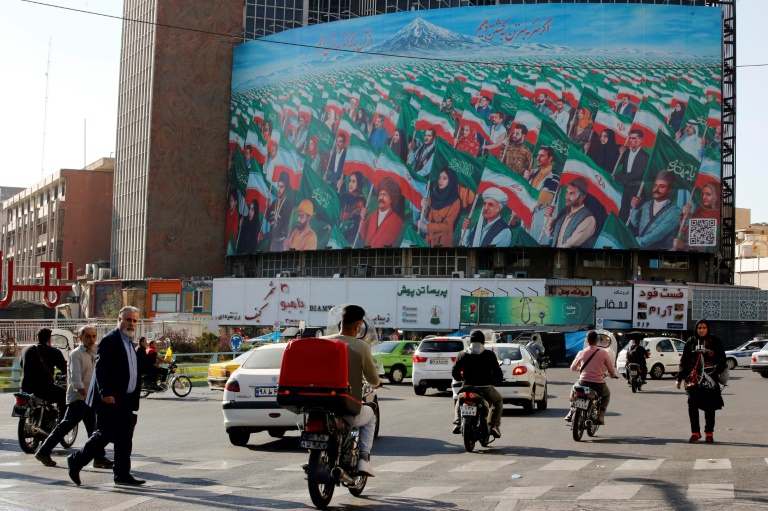Outcry after Iran hangs two on blasphemy charges

People walk across a pedestrian crossing in Valiasr square in the centre of Iran’s capital Tehran on October 25 2022.
Paris – Iran on Monday hanged two men on charges of spreading blasphemy on social media, prompting US condemnation and accusations from Amnesty International the Islamic republic has reached a “new low” in a spree of executions.
Sadrollah Fazeli Zare and Youssef Mehrdad, convicted of desecrating the Koran and insulting the Prophet Mohammed, were hanged in the morning in a prison in the central city of Arak, the judiciary’s Mizan Online website said.
Their execution came as concern intensifies about a spike in executions in Iran this year, after 2022 saw more people hanged than in any year since 2015, according to rights groups.
Activists accuse the authorities of using capital punishment as a means to intimidate the population after anti-regime protests that erupted in September last year shook the clerical leadership.
Amnesty said in a statement Monday’s execution represented “a shocking new low for Iran’s authorities and only furthers Iran’s pariah status”.
“They were hanged solely for social media posts in a grotesque assault on the rights to life and freedom of religion.”
In Washington, State Department spokesman Vedant Patel said the executions were a “grave reminder of the Iranian regime’s penchant for abusing and violating the human rights of Iranian people.”
“Blasphemy laws remain an affront to human rights worldwide, including in Iran,” he told reporters.
The director of Norway-based Iran Human Rights (IHR), Mahmood Amiry-Moghaddam, said the execution of “two people for expressing their opinions” should be a “turning point for countries with freedom of expression values” in their relations with Tehran.
– ‘Government-sanctioned murder’ –
The pair were accused of operating social media channels and groups that promoted atheism and insulted Islamic “sanctities”, Mizan said.
It added one of them in March 2021 had purportedly confessed during a court session to publishing the content in question on his social media account.
Reports said the two were arrested in June 2020 over a channel on the Telegram messaging app.
They were sentenced to death in April 2023 and then held in solitary confinement, according to reports.
Mehrdad was the father of three children, according to Persian media based outside Iran.
“The execution of these citizens is a blatant example of the government-sanctioned murder of citizens who have different beliefs than those of the Islamic republic’s leaders,” said Hadi Ghaemi, director of the New York-based Center for Human Rights in Iran.
While the Islamic republic’s law permits executions for blasphemy, hangings of people convicted of such charges have been relatively rare in recent years.
IHR said an Iranian man was executed in 2013 for questioning the Koran’s narrative on the life of the prophet Jonah in the belly of a whale.
The vast majority of people executed in Iran have been convicted of drug-related or murder charges.
– ‘Crush protests’ –
Iran executes more people yearly than any other nation except China, according to rights groups including Amnesty.
IHR and the Paris-based Together Against the Death Penalty said last month 2022 had seen the highest number of executions in the Islamic republic since 2015 with 582 people hanged.
And so far in 2023, at least 208 people have been executed, according to IHR.
On Friday, Amiry-Moghaddam said that over the 10 previous days Iran had executed “one person every six hours… while the international community has remained silent”.
The spike in executions since last year has coincided with nationwide demonstrations triggered by the September 16 death in custody of Mahsa Amini, who had been arrested for allegedly violating strict dress rules for women.
Four men were executed in connection with the protests in 2022, drawing international condemnation, but activists want greater pressure on Iran to stop all executions.
On Saturday, Iran executed Swedish-Iranian dissident Habib Chaab for “terrorism”, prompting sharp criticism from Sweden and the European Union.
Amnesty said the execution came after a grossly unfair trial marred by torture and forced confessions.
Meanwhile, German-Iranian Jamshid Sharmahd, 68, is condemned to death by Iran, which does not recognise dual nationality, in connection with a deadly mosque bombing in 2008.
His family strongly reject the charges and say Sharmahd was abducted by Iranian security forces to face trial in Tehran while travelling in the Gulf in 2020.
“Without urgent international action, the Iranian authorities will continue to deploy the death penalty to torment and terrorise the entire population, crush protests and other forms of dissent,” said Amnesty.
